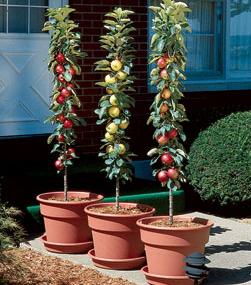
Columnar Apple Trees: A Comprehensive Guide
Columnar apple trees have gained popularity among gardeners and fruit enthusiasts due to their unique growth habit and suitability for small spaces. These trees, characterized by their narrow, upright form, are perfect for urban gardens, patios, and even balconies. This article will delve into the various aspects of columnar apple trees, including their history, benefits, growing conditions, care requirements, and popular cultivars. Additionally, a FAQ section will provide answers to common questions about these fascinating trees.
Overview of Columnar Apple Trees
Columnar apple trees are a result of a natural genetic mutation that causes them to grow predominantly in a vertical direction with minimal lateral branching. This unique growth habit allows them to occupy less space than traditional apple trees while still producing full-sized apples. Typically reaching heights of 7 to 10 feet and only 2 to 3 feet wide, columnar apple trees can be planted in tight spaces without sacrificing fruit production.
History
The first columnar apple tree was discovered in the 1960s when a McIntosh apple tree exhibited a natural mutation. This tree’s vertical growth pattern led to the development of several cultivars through selective breeding. Since then, columnar apple trees have become increasingly popular among home gardeners and commercial growers alike.
Benefits of Columnar Apple Trees
- Space Efficiency: Their narrow form makes them ideal for small gardens and urban settings.
- Early Fruit Production: Many columnar varieties produce fruit within the first year of planting.
- Aesthetic Appeal: Their elegant shape adds visual interest to any landscape.
- Ease of Maintenance: Smaller size means easier pruning and harvesting compared to traditional apple trees.
- Cross-Pollination: Planting multiple varieties can enhance fruit yield through cross-pollination.
Growing Conditions for Columnar Apple Trees
1. Climate Requirements
Columnar apple trees thrive in USDA hardiness zones 3 to 8. They require a period of winter chill for proper fruit development, so it’s essential to choose varieties suited for your local climate.
2. Soil Requirements
- Well-Drained Soil: Columnar apple trees prefer loamy soil that drains well to prevent root rot.
- pH Level: The ideal soil pH is between 6.0 and 7.0.
3. Sunlight
These trees require full sun for optimal growth and fruit production. Aim for at least 6-8 hours of direct sunlight daily.
4. Spacing
When planting multiple columnar apple trees, space them about 2 feet apart to allow for adequate root development.
Popular Cultivars of Columnar Apple Trees
Here’s a comparison table highlighting some popular columnar apple tree cultivars:
| Cultivar Name | Description | Fruit Size | Ripening Time | Disease Resistance |
|---|---|---|---|---|
| Northpole | Resembles McIntosh; crisp texture | Medium | Mid-September | Good |
| Golden Sentinel | Similar to Golden Delicious; sweet | Medium | Early September | Good |
| Scarlet Sentinel | Green-yellow apples with red blush | Medium | Late September | Moderate |
| Tasty Red | Bright red fruits; juicy and sweet | Medium | Mid-September | Good |
| Blushing Delight | Green fruits blushed with red | Medium | Mid-September | Good |
Care Requirements for Columnar Apple Trees
1. Watering
- Regular watering is crucial during the growing season, especially during fruit development.
- Ensure the soil is consistently moist but not waterlogged.
2. Fertilization
- Use a balanced fertilizer in early spring as new growth begins.
- Follow up with additional applications as needed throughout the growing season.
3. Pruning
- Prune in late winter or early spring before new growth starts.
- Remove any dead or diseased branches and thin out crowded areas to promote airflow.
4. Pest and Disease Management
Columnar apple trees can be susceptible to common apple diseases such as:
- Apple Scab: Prevent by choosing resistant cultivars and applying fungicides if necessary.
- Fire Blight: Prune affected branches immediately and avoid overhead watering.
- Cedar Apple Rust: Plant resistant varieties and maintain good air circulation around the tree.
Environmental Considerations
Planting columnar apple trees can have positive environmental impacts:
- They contribute to biodiversity by attracting pollinators like bees.
- They improve air quality through photosynthesis.
- They can be part of sustainable gardening practices by reducing the need for large plots of land.
For more detailed information about growing apples and their environmental benefits, you can refer to Wikipedia.
Frequently Asked Questions (FAQ)
What are columnar apple trees?
Columnar apple trees are a type of apple tree that grows in a narrow, upright form with minimal lateral branching, making them suitable for small spaces.
How tall do columnar apple trees grow?
Most columnar apple trees reach heights between 7 to 10 feet at maturity.
Do I need more than one columnar apple tree for pollination?
Yes, most columnar apple varieties require cross-pollination from another variety to produce fruit effectively.
How much space do I need to plant columnar apple trees?
Space them about 2 feet apart to allow for adequate root development while maximizing your planting area.
When do columnar apple trees produce fruit?
Many columnar varieties can produce fruit within the first year after planting, depending on growing conditions.
How do I care for my columnar apple tree?
Care includes regular watering during the growing season, fertilization in early spring, pruning in late winter or early spring, and monitoring for pests and diseases.
Conclusion
Columnar apple trees offer an excellent solution for gardeners with limited space who still want to enjoy homegrown apples. With their unique growth habit, aesthetic appeal, and ease of maintenance, these trees are perfect for urban settings or small gardens. By understanding their growing conditions and care requirements, you can successfully cultivate these delightful fruit-bearing plants in your own backyard or patio.Whether you choose popular cultivars like Northpole or Golden Sentinel or explore other varieties suited to your climate, planting columnar apple trees can enhance your landscape while providing delicious fruits for years to come.


